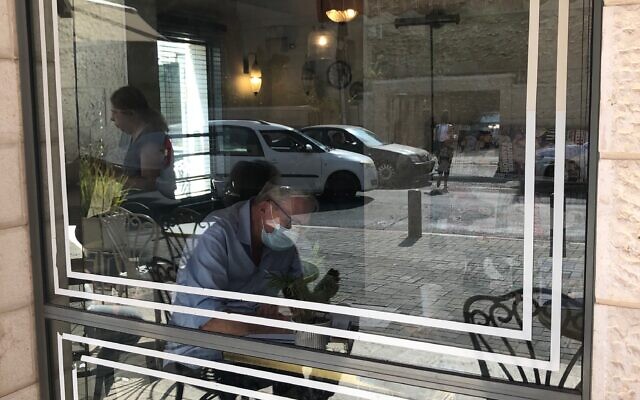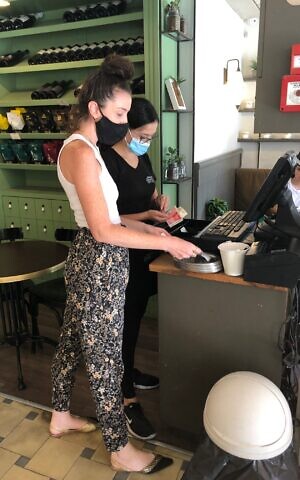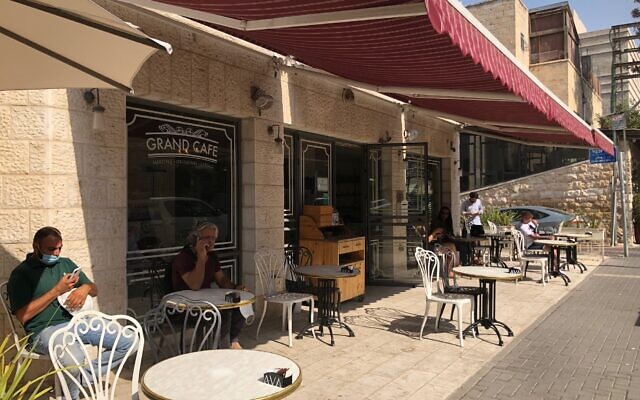FACES OF THE LOCKDOWN #2: Adi Talmor tells us, 'We lost 2020'
Restaurant owner Adi Talmor is not optimistic: "The catastrophe is around the corner from an economic standpoint ... businesses will not recover from this second lockdown."

JERUSALEM — Israel is well into a second national lockdown now that is expected to last well more than the original three weeks in order to slow the spread of skyrocketing COVID-19 infections around the country.
Schools, restaurants, shops, gyms and many workplaces have been shut down since Sept. 18 and the government has yet to provide an exit strategy - and some hope - to businesses who are struggling with the closures.
 The Grand Cafe in Jerusalem, one of Adi Talmor's establishments, just before a second three-week closure due to COVID. (Photo: All Israel News)
The Grand Cafe in Jerusalem, one of Adi Talmor's establishments, just before a second three-week closure due to COVID. (Photo: All Israel News)All Israel News spoke with several people whose lives are impacted and are experiencing some severe financial consequences from the closures. Adi Talmor is the owner of Grand Cafe, Sushi Rehavia and Toy Bar along with two other business partners. Sushi Rehavia and Toy Bar have been in business for 13 years and the Grand Cafe — the neighborhood coffee shop in Baka — for nine years.
He said when he thinks about the future, all he sees is black.
ALL ISRAEL NEWS: How did you weather the first shutdown?
TALMOR: That was our first shock because no one knew how long it would last and what would be after. When we came out of it, we scrambled to bring all our employees back to work again. A lot of them have families or are students and this is their main source of income.
We opened under the Tav Sagol (the Purple Label, Israel’s Health Ministry regulations for COVID) adhering to all the restrictions: distance between tables, limited number of occupants. But in any case we never reached our normal capacity, we were at 50 to 60 percent. In August we almost reached normal, about 85 percent. But then came the second shut down and here we are.
So you cannot say “we got over it.” No, we just prolonged the problem. For those businesses that are based on foot service, you are talking about one to three months of cash flow lost, and then you still owe money (from before the first shutdown) for January through February to your suppliers.
 The Grand Cafe in Jerusalem, one of Adi Talmor's establishments, just before a second three-week closure due to COVID. (Photo: All Israel News)
The Grand Cafe in Jerusalem, one of Adi Talmor's establishments, just before a second three-week closure due to COVID. (Photo: All Israel News)ALL ISRAEL NEWS: How did you do between lockdowns? Did you have reason to hope things would go back to normal?
TALMOR: We tried to put the business on the right track … but income was down 50 percent. This is a hard position to sustain.
Nevertheless, everyone was hopeful after the first lockdown. We even thought the fall holidays could’ve been better this year because Israelis aren't flying overseas. People thought this would be the recovery of some of their financial injuries from the first lockdown: “We can fill our pockets for the winter to come.” Jerusalem winters are hard and, with the flu plus coronavirus, we assume it would be harder this year.
Other stories in this series: FACES OF THE LOCKDOWN part 1: Mati Ariel, sports club owner
But now, instead of the holiday rush, we started the second lockdown — and it’s killing people’s dreams that they were going to make money back during the holidays.
Normally, you put money in the bank to get through the winter in a better position. Instead, many are still paying back last winter’s expenses. Many businesses adapted to the new restrictions and started making deliveries (which are allowed under the lockdown). But you can’t do that in one or two months. Many businesses didn’t have enough time to adjust … and now we are shut down again.
ALL ISRAEL NEWS: How much do you think the second shutdown will cost you?
TALMOR: It is going to be hundreds of thousands of shekels. It's not that we lose that amount, but you have to pay rent, half a month’s salary to your employees for September, pay bills to your suppliers — which alone is 200,000 shekels — and we don’t have the income.
It’s going to be a big problem for a lot of businesses. We had to restrict 50 to 60 people in the Toy Bar, which normally has a capacity of 200. So you open, but it is simply to say you’re here and to give people an opportunity to come back to work.
ALL ISRAEL NEWS: How do you feel the government has handled the pandemic?
TALMOR: The government is not dealing with this crisis as it should be, not before the first shutdown, not between — because everyone knew there was gonna be another break out — and they didn’t prepare for this one. Not the health system, not the economic system.
The worst thing is they don’t give you the right information, not for the small business owner, which is the engine of the Israeli economy.
I have associates in other countries and their governments gave them money so they aren’t sitting at home stressed about where their income is coming from. Here people were sitting at home and not making any money either. It is stressful.
My partners and I stopped taking a salary, we lowered some salaries of some employees. If we have 50 to 60 percent income we can’t pay 100 percent of what we paid before or we close down the business.
And, the worst hasn’t come yet. The catastrophe is around the corner from an economic standpoint. I don’t know what will be with COVID, but businesses will not recover from this second lockdown. I cannot be optimistic. I look at the future and I only see black.
 The Grand Cafe in Jerusalem, one of Adi Talmor's establishments, just before a second three-week closure due to COVID. (Photo: All Israel News)
The Grand Cafe in Jerusalem, one of Adi Talmor's establishments, just before a second three-week closure due to COVID. (Photo: All Israel News)ALL ISRAEL NEWS: How have you managed to survive?
TALMOR: The sushi business is working well on deliveries and actually we are reaching more areas than we used to do. We doubled our deliveries and our income on that front. But it’s a huge expense: apartments for the foreign sushi chefs, 200 employees, motorcycles and fuel for delivery.
But it is ridiculous that I can go to a supermarket or a pastry shop and buy bread and cookies and their coffee, but why can’t I do that at the Grand Cafe? Why can’t I go to the window and order a pizza or a sandwich to take home? During the first lockdown, the supermarkets started selling everything — TVs, computers, etc. — so what did you accomplish? You gave the supermarkets the power to sell more and meanwhile crushed the businesses of everyone else that you closed down. So 200 people can go into a supermarket but four people can’t walk into a cafe and buy a sandwich to take away?
I’m not sure they know what they are doing.
ALL ISRAEL NEWS: Have you received any financial aid from the government?
TALMOR: We got some aid from the government, but sometimes you get less than what you applied for. Then you have to wait for the official letter before you can appeal the decision. We got some money back for rehiring our employees.
So you get some money from the government. But I think it was too late, because a lot of people didn’t get their money or it wasn’t clear to them how. So then I can’t sit at home with my family in peace and know someone is going to help me. Many people for the first two months didn’t know what to do because it wasn’t straightforward.
The economy is going to be in a very bad situation. We lost 2020. We started this crisis in the beginning of March and now we are going into October! It is a missing year.
By the way, it is very hard to shut a business even if you know you’re not gonna make money. You have to earn enough money just to pay off your losses of the last six months. To shut down a business the level of grand cafe, we would have to first earn 600,000 to 700,000 shekels.
So you hope to make the cash flow and get back on track instead. But after these past six months it became clear that many will have to open just to make enough money just to shut down their business. Just a few days ago there was a report that bankruptcy has tripled compared to last year in those months.
We are going to open because we hopeful the best. But no one knows how the coronavirus will change customer behavior. People will have to see how to change our business models to make our businesses survive after corona, or to live with corona.
This is not so simple in every business. Look, not every business can become a delivery service. And I cannot deliver the atmosphere or the vibe and the music of Toy Bar.
We hope that after Sukkot the situation is going to be better and we can get back to work. We will try to do our best to get back.
Let’s hope the local municipalities and the Treasury Department will do what they have to do in these times in order to help people get back on track, recover, to help businesses function and to give them all the options and opportunities to survive. If not, there is gonna be a terrible situation here.
FACES OF THE LOCKDOWN part 1: Mati Ariel, sports club owner

Nicole Jansezian was the news editor and senior correspondent for ALL ISRAEL NEWS.













